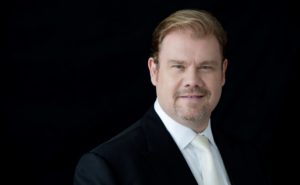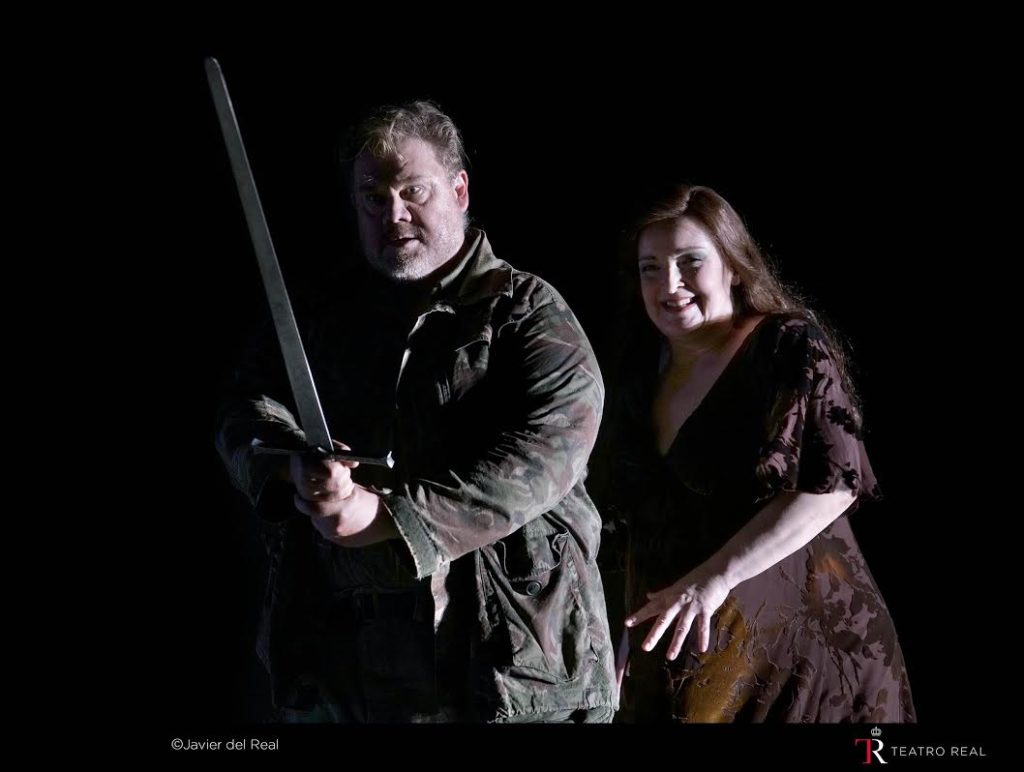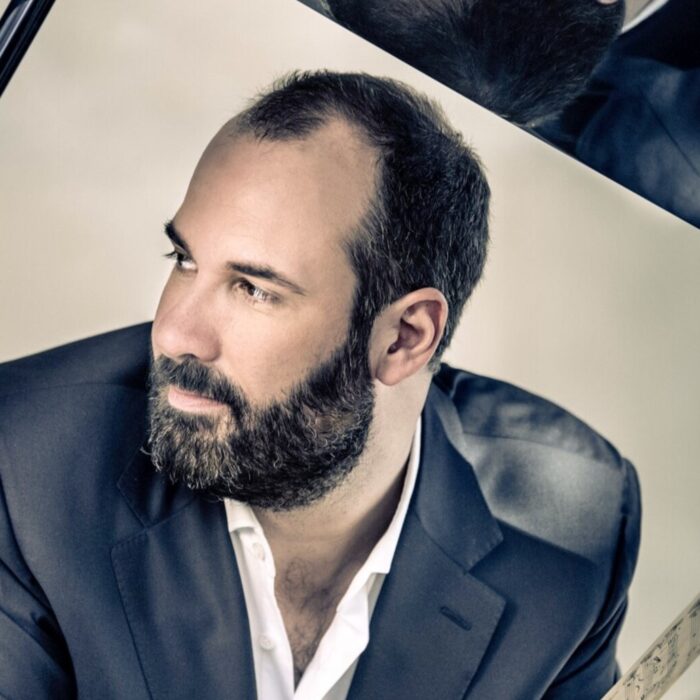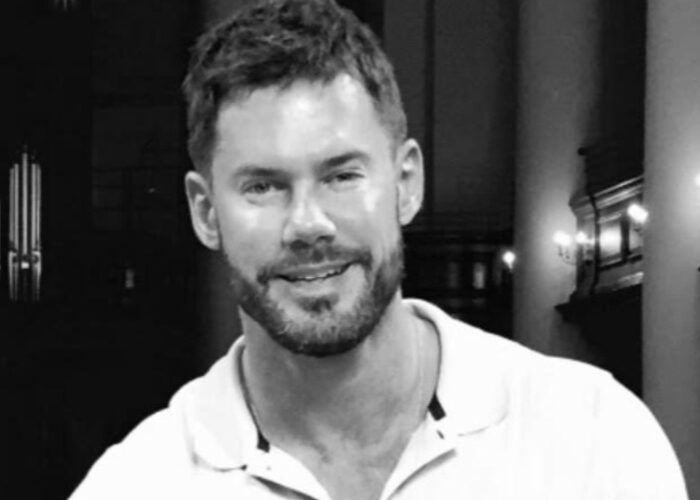
Q & A: Heldentenor Stuart Skelton on His Ongoing Relationship With Wagner’s Music
By Mauricio Villa(Credit: Sim Canetty-Clarke)
Few tenors today have the Wagnerian pedigree that Stuart Skelton has.
The Australian tenor, who has taken on pretty much every major role by the master of Bayreuth, has opened major productions of Wagner’s operas around the world. In the midst of his recent production of “Die Walküre” at the Teatro Real de Madrid, Operawire had an opportunity to talk to Skelton about his career and his view of Wagner’s works and his place in them. During the course of the conversation, Skelton revealed his relationship to Wagner’s music, why the role of Tristan is hardest, and why he has no interest in “Siegfried” or “Tannhäuser.”
OperaWire: Why did you become an opera singer?
Stuart Skelton: I went to a school in Sydney which was attached to the church of England and I was a choir boy. Then I went to the university to study economics and law, and then I realized that I did not want to work in law or banking, that what I really wanted was to sing. So, I left Australia and went to the university of Cincinnati to do degrees in music, and the rest is history.
The important thing was that I realize that singing was the thing that I could genuinely be excellent at, while everything else was just going to be okay. Because when you are 18, you don’t really know the path you are going to take. I came to it a bit latter, but I don’t think this is a bad thing because on the other hand you are much more experienced, you have already lived more life, and I consider that the contribution that I make as a singer is one thing that I am excellent at, and that’s the important thing in life. Whatever you do in life, do it to the best of your ability, and it should make you happy to do what you are doing.
OW: Was your voice dramatic when you began singing professionally?
SS: No, voices are never dramatic at the beginning, I just had the right color and over time, as I worked on things that were not dramatic repertoire, all the people who were listening to my singing – teachers, coaches, conductors – said to me: “This is a voice which is heading into this direction.”
So, I followed their advice and just followed the natural progression. I never came with the concept of “dramatic anything.” I have worked with lots of young singers in masterclasses all over the world, and one thing that I try to do gently, and I hope it comes across this way, is when I find young 23-year-old lyric baritone singers who say, “I am moving into a Heldentenor repertoire,” I answer,”If you are a lyric baritone, you are not dramatic anything. You are still lyric.”
The whole concept of a dramatic voice in the early 20s is completely nonsense, except for the exceptional freaks of nature, like Nina Stemme or Birgit Nilsson. What happens is, as the voice and the body physically matures, some heroic qualities grow into the voice. At least this is the case with male voices, because females don’t have a change in their voices like men have. So it might be probable to find women in the early 20s with dramatic voices.
OW: Do you consider yourself a dramatic tenor? A Heldentenor? Or is it the same?
SS: I think they are two words which mean the same in different languages. The concept of Heldentenor came post-Wagner. It just didn’t exist at his time. Tenors who sang Weber and Beethoven were the tenors who sang Wagner repertoire at that time. But if we have to put a label, well, yes, I am a Heldentenor because that is the repertoire I sing.
But to certain people, when they think about Heldentenors, they have an image of a voice in their head, and that might be limiting because there are lots of examples of tenors who ended up singing Heldentenor repertoire who began singing Mozart or Rossini repertoire. Gösta Winbergh, Robert Gambill or Gregory Kunde who had a glorious career singing Bellini and Rossini and now it is a glorious Otello. So, you can come to the dramatic repertoire from lots of different ways.
To most people a Heldentenor or dramatic voices depends on stuff you shouldn’t sing. Another of my signature roles is “Peter Grimes,” a role which was written for the least heroic tenor on the planet. But then every tenor who has sung it made it their own, because it is a role that vocally any kind of tenor could sing. But singing dramatic doesn’t mean that it all has to be loud and screamy. I am happy to sing all the things I am singing, whether they are for for a Heldentenor or not.
OW: Siegmund from “Die Walküre” is one of your signature roles. What are the vocal and musical difficulties of this role?
SS: I think the difficulties, like in any role, are there for someone whose voice doesn’t suit the role. All my vocal difficulties for me would come if I sing Bellini, Rossini or Donizetti. I wish I could do that, I just can’t; I wish I would wake up in the morning and have a voice like Javier Camarena or Juan Diego Flórez, but I don’t have that and I will never have that.
The challenge with Wagner is to sing his music as beautiful as you can, and as long as you can. Siegmund gets the opportunity to sing such beautiful melodies about spring and love, but there is a big orchestra so the real challenge is to sing beautifully but still make enough sound.
OW: What are the physical challenges of this role, specifically in this production?
SS: I am getting old, and falling to my knees five times per night gets tiring. I have to climb stairs, run around and I don’t care about that stuff, but my knees are already destroyed. I even had my right knee surgically improved some years ago; the first act is about one hour and 10 minutes, I am on stage all the time, and I have to fall to my knees, get up, then fall again. It was fun at the beginning but as you get older, it is not that fun anymore.
OW: Isn’t it hard to be on stage for that long without a moment’s rest or without the possibility of drinking water?
SS: No, not at all! In fact, one of the things happening in the scene is Sieglinde offering Siegmund something to drink.
OW: And do you really drink on stage during the scene? Some singers are afraid of drinking while singing.
SS: Oh! Yes, I do, absolutely. I mean if you have the chance to drink, why not? If the other character just gives the chance to drink, I always make sure that there is water in it. The trip is to drink slowly. I was once in an embarrassing situation on stage because I drank too fast and felt in the need to cough. Anyway, being on stage for a little bit more than an hour is not extremely long/ I mean in Tristan you are on stage for that long just in Act three.
OW: How do you see Siegmund compared to the other Wagner roles that you have sung?
SS: Well, it is similar to Parsifal, where the general tessitura is lower and the part is short, especially if you compared them with Lohengrin or Erik in “The Flying Dutchman,” and of course Tristan. The tessitura between Siegmund and Tristan is the same. It does not go higher than an A natural, but Tristan goes there more often, and the role is much longer.
But roles like [Walter in] “Meistersinger” or Lohengrin are higher. Anyway Lohengrin is a different kind of challenge all together, apart from being longer, the characters are so different. Lohengrin has been sent from God with a mission, so you must show that Lohengrin is above reality, while Siegmund’s reality is set in the human world. He has been chased, he is so tired that he falls sleep by the fire in a stranger’s house. There is a physical reality in Siegmund that Lohengrin doesn’t have. That means that there is a very different vocal approach for these two roles, while one is grounded in the earth the other is in heavens.

OW: Why have you not sung Tannhäuser?
SS: I just don’t like it. I think that this is probably the best description. It is vocally a little bit awkward. It is like singing Erik but three times longer, and the tessitura is quite unforgiving. By the time I had the age to sing Tannhäuser I never got asked, so I missed it. The two roles that somehow, I regret I have missed are Tannhäuser and “Meistersinger.” Now that I am going into my mid-50s and coming from the lowest Wagner repertoire it would be silly for me to try those roles when there are singers in the early 40s who can deal much better with the tessitura.
OW: In your opinion, what is the hardest Wagner role you have sung?
SS: Tristan! To begin with, it was the hardest one to learn because it was the hardest one to put it into the brain, because it has too many words. And I do speak German, but still, that amount of music and words to put into memory. And then “Tristan and Isolde,” they don’t have anything physical to hold on to. The Ring Cycle is all about swords, helmets, gold, dragons. It is all about things, while in “Tristan and Isolde” it is all about ideas: love, death, light, night. So it was so hard to learn the role.
And then, of course you have Act three. During most of Act one there is not much to do and there is some sense of calmness, until the end of the act where it explodes. In Act two you enter with this sense of explosion which last for about 20 minutes until you come to “O sink hernieder,” which means that you bring all that back to this tiny little thread and do it as beautiful and lyrical as possible. And then you go back to explode again at the end.
Then you have about 25 or 30-minute pause, and in Act three you have to go back to everything again. From the minute he gets up from his deathbed, he just does not stop until he dies. But Wagner was very clever when he wrote this part. Tristan can be see at the top of everything, he is completely insane, he is physically dying and being completely bizarre on stage, and just when you get to what you think your vocal limit is, and you have the feeling that if you sing one more page you couldn’t go on for the rest, Wagner makes you collapse and Kurwenal sings. It is perfectly timed, and you just need this time off, and Wagner just gives you enough, only just enough.
The thing with Tristan is that while his mind and his body are completely disintegrating, his soul is coming together for the first time and he is going to be transfigured with Isolde at the end of the opera. So you have to try and sing to the edge of madness, then collapse, and sing uplifted at the same time. So you are working in two different directions during the entire third act, and it is so long.
So what I do with Tristan in third act, with all the interruptions of Kurnewal in between is think in sections. I have to sing this bit and then I am done. Then I have another bit and I am done. And on and on. And then you realize that you sing the last “Isolde!” and you are really done. So I cut it up in my mind in these tiny little sections because if you start to think about what you have to sing in Act three in the middle of Act two you will never get to the end.
Athletes who run marathons talk about hitting the wall, and for me singing Tristan is similar. Apart from accepting that the wall is there, you need to have a plan to go on from the moment I hit the wall to just reach the end. And in Tristan’s Act three you are going to hit the wall, so the ideal is to hit the wall when you sing “Isolde!” and just die. But most of the time you hit the wall early, and it is devastating both vocally and physically. So, my plan is to negotiate the time I have while Kurnewall is singing to try to put that wall further away.
OW: Have you considered the role of Siegfried?
SS: No! I have been asked quite a few times, and in fact I have sung Act three from “Siegfried: in concert and had a fabulous time, but I was very pleased that I didn’t have to do Act one and two on the same day.
I would love to sing the forging song by itself but not the rest of the stuff that comes after, or before, or any Act two.
And my problem as well is that I don’t like him. Siegfried is not a likable person. His solution to every problem is to kill. He is the potential hero with the sword, but he doesn’t know how to do things. He matures, and in “Götterdämmerung” he is a more approachable character, but musically I don’t make the right sound. He needs to sound youthful and fresh, and I sound like I am almost in retirement. My voice is much darker than that.
OW: Shifting gears from Wagner for a bit, you have sung Verdi’s “Otello” rather prominently. Have you considered other Verdi operas?
SS: Well I actually sang “Traviata” at the beginning of my career a very long time ago. But by the time “Trovatore” or “Aida” came around, I was already singing Siegmund. I debuted “Walküre” in 2003, and when you sing these roles, people don’t think of you for Italian repertoire, even when I have Otello and Pagliacci in my Italian repertoire. I get asked to do them often, but most of what I sing comes from Wagner repertoire and Janácek. And I am getting much too old to get to learn new things.
OW: Do you have any future roles coming up?
SS: No, I have an agenda until 2024 and it is basically the same stuff. “Walküre,” “Parsifal,” “Tristan,” “Fidelio,” “Peter Grimes.” But that is good. That means that I can expend whatever is left of my career perfecting the things I have done rather than shifting and changing all the time. I have taken my cue from other singers who I mentioned before, Juan Diego Flórez or Javier Camarena. They know exactly what they sing, and they do it better than anyone in the planet, and that’s very clever. Because you do see voices that make a big splash early on, and because of that they broaden their repertoire and then you don’t hear about them and that is a shame.
I have six or seven roles that I sing and know really well, and I have had the chance to sing in beautiful houses, with wonderful conductors and amazing colleagues. I stay within my capabilities to be sure that whatever I sing is always as good as I can make it on the day.
If interesting things come up I would look at them carefully, like I am learning new stuff for a concert in London in March. It is German expressionism which is very fun to learn. But I am happy with singing what is on my list. The minute you start rehearsals it is like a home coming, and your body and your voice understand what they have to do.
OW: To conclude, how has it been to return to Madrid for the first time since singing Albeniz’s “Merlin” in 2003?
SS: It’s been amazing being back in Madrid and having a set of colleagues like this. And working with Pablo Heras-Casado for the first time has been a revelation. He has such a feeling for the singers, for the orchestra, and for the drama as well. Because he is coming to the Ring Cycle for the first time, and is working with people who have done it already a lot of times, he sits down with you and asks, “This phrase here. How do you feel it? How do you see it?” Then he adds, “Instrumentally this is what is happening, and this is what I need.” So we find a way between us abd at the end it feels like the singing is coming out from the orchestra. He is very clever about how the orchestra lines and the voices intertwine. It has been really terrific work and I am having such a wonderful time. It has been fantastic to get back to Madrid with colleagues that I have known for so long.


